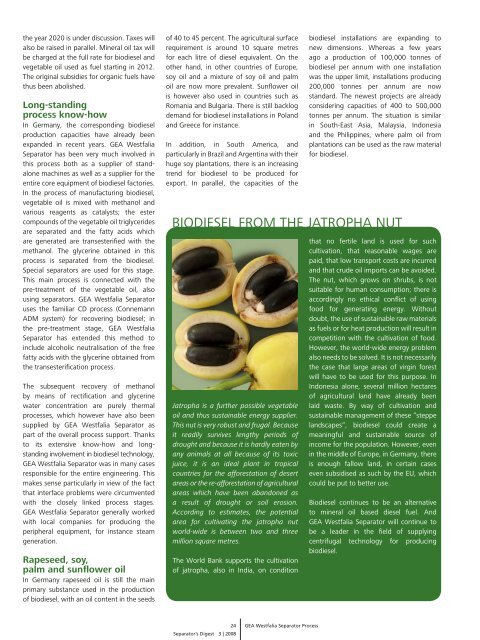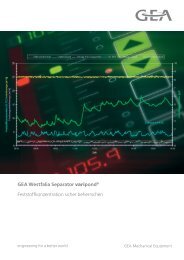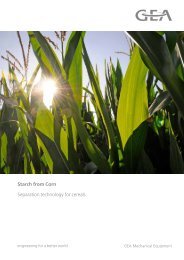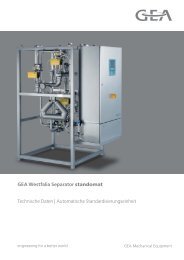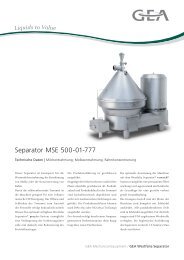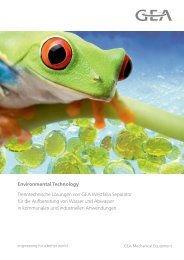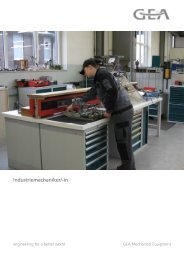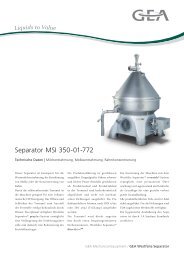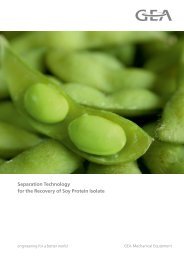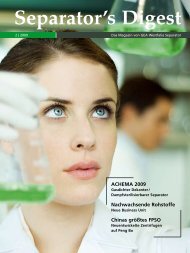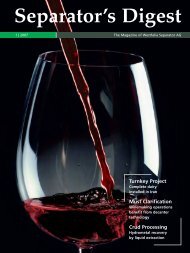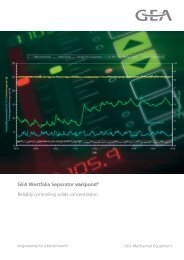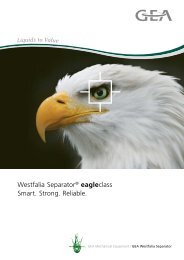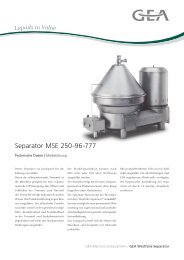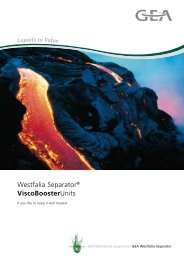Separator's Digest - GEA Westfalia Separator Group
Separator's Digest - GEA Westfalia Separator Group
Separator's Digest - GEA Westfalia Separator Group
Create successful ePaper yourself
Turn your PDF publications into a flip-book with our unique Google optimized e-Paper software.
the year 2020 is under discussion. taxes will<br />
also be raised in parallel. Mineral oil tax will<br />
be charged at the full rate for biodiesel and<br />
vegetable oil used as fuel starting in 2012.<br />
the original subsidies for organic fuels have<br />
thus been abolished.<br />
Long-standing<br />
process know-how<br />
in Germany, the corresponding biodiesel<br />
production capacities have already been<br />
expanded in recent years. <strong>GEA</strong> <strong>Westfalia</strong><br />
separator has been very much involved in<br />
this process both as a supplier of standalone<br />
machines as well as a supplier for the<br />
entire core equipment of biodiesel factories.<br />
in the process of manufacturing biodiesel,<br />
vegetable oil is mixed with methanol and<br />
various reagents as catalysts; the ester<br />
compounds of the vegetable oil triglycerides<br />
are separated and the fatty acids which<br />
are generated are transesterified with the<br />
methanol. the glycerine obtained in this<br />
process is separated from the biodiesel.<br />
special separators are used for this stage.<br />
this main process is connected with the<br />
pre-treatment of the vegetable oil, also<br />
using separators. <strong>GEA</strong> <strong>Westfalia</strong> separator<br />
uses the familiar Cd process (Connemann<br />
AdM system) for recovering biodiesel; in<br />
the pre-treatment stage, <strong>GEA</strong> <strong>Westfalia</strong><br />
separator has extended this method to<br />
include alcoholic neutralisation of the free<br />
fatty acids with the glycerine obtained from<br />
the transesterification process.<br />
the subsequent recovery of methanol<br />
by means of rectification and glycerine<br />
water concentration are purely thermal<br />
processes, which however have also been<br />
supplied by <strong>GEA</strong> <strong>Westfalia</strong> separator as<br />
part of the overall process support. thanks<br />
to its extensive know-how and long-<br />
standing involvement in biodiesel technology,<br />
<strong>GEA</strong> <strong>Westfalia</strong> separator was in many cases<br />
responsible for the entire engineering. this<br />
makes sense particularly in view of the fact<br />
that interface problems were circumvented<br />
with the closely linked process stages.<br />
<strong>GEA</strong> <strong>Westfalia</strong> separator generally worked<br />
with local companies for producing the<br />
peripheral equipment, for instance steam<br />
generation.<br />
Rapeseed, soy,<br />
palm and sunflower oil<br />
in Germany rapeseed oil is still the main<br />
primary substance used in the production<br />
of biodiesel, with an oil content in the seeds<br />
of 40 to 45 percent. the agricultural surface<br />
requirement is around 10 square metres<br />
for each litre of diesel equivalent. on the<br />
other hand, in other countries of Europe,<br />
soy oil and a mixture of soy oil and palm<br />
oil are now more prevalent. sunflower oil<br />
is however also used in countries such as<br />
romania and Bulgaria. there is still backlog<br />
demand for biodiesel installations in poland<br />
and Greece for instance.<br />
in addition, in south America, and<br />
particularly in Brazil and Argentina with their<br />
huge soy plantations, there is an increasing<br />
trend for biodiesel to be produced for<br />
export. in parallel, the capacities of the<br />
Jatropha is a further possible vegetable<br />
oil and thus sustainable energy supplier.<br />
This nut is very robust and frugal. Because<br />
it readily survives lengthy periods of<br />
drought and because it is hardly eaten by<br />
any animals at all because of its toxic<br />
juice, it is an ideal plant in tropical<br />
countries for the afforestation of desert<br />
areas or the re-afforestation of agricultural<br />
areas which have been abandoned as<br />
a result of drought or soil erosion.<br />
According to estimates, the potential<br />
area for cultivating the jatropha nut<br />
world-wide is between two and three<br />
million square metres.<br />
the World Bank supports the cultivation<br />
of jatropha, also in india, on condition<br />
biodiesel installations are expanding to<br />
new dimensions. Whereas a few years<br />
ago a production of 100,000 tonnes of<br />
biodiesel per annum with one installation<br />
was the upper limit, installations producing<br />
200,000 tonnes per annum are now<br />
standard. the newest projects are already<br />
considering capacities of 400 to 500,000<br />
tonnes per annum. the situation is similar<br />
in south-East Asia, Malaysia, indonesia<br />
and the philippines, where palm oil from<br />
plantations can be used as the raw material<br />
for biodiesel.<br />
BiodiEsEl froM thE jAtrophA nut<br />
24<br />
<strong>Separator</strong>’s <strong>Digest</strong> 3 | 2008<br />
<strong>GEA</strong> <strong>Westfalia</strong> <strong>Separator</strong> Process<br />
that no fertile land is used for such<br />
cultivation, that reasonable wages are<br />
paid, that low transport costs are incurred<br />
and that crude oil imports can be avoided.<br />
the nut, which grows on shrubs, is not<br />
suitable for human consumption; there is<br />
accordingly no ethical conflict of using<br />
food for generating energy. Without<br />
doubt, the use of sustainable raw materials<br />
as fuels or for heat production will result in<br />
competition with the cultivation of food.<br />
however, the world-wide energy problem<br />
also needs to be solved. it is not necessarily<br />
the case that large areas of virgin forest<br />
will have to be used for this purpose. in<br />
indonesia alone, several million hectares<br />
of agricultural land have already been<br />
laid waste. By way of cultivation and<br />
sustainable management of these “steppe<br />
landscapes“, biodiesel could create a<br />
meaningful and sustainable source of<br />
income for the population. however, even<br />
in the middle of Europe, in Germany, there<br />
is enough fallow land, in certain cases<br />
even subsidised as such by the Eu, which<br />
could be put to better use.<br />
Biodiesel continues to be an alternative<br />
to mineral oil based diesel fuel. And<br />
<strong>GEA</strong> <strong>Westfalia</strong> separator will continue to<br />
be a leader in the field of supplying<br />
centrifugal technology for producing<br />
biodiesel.


